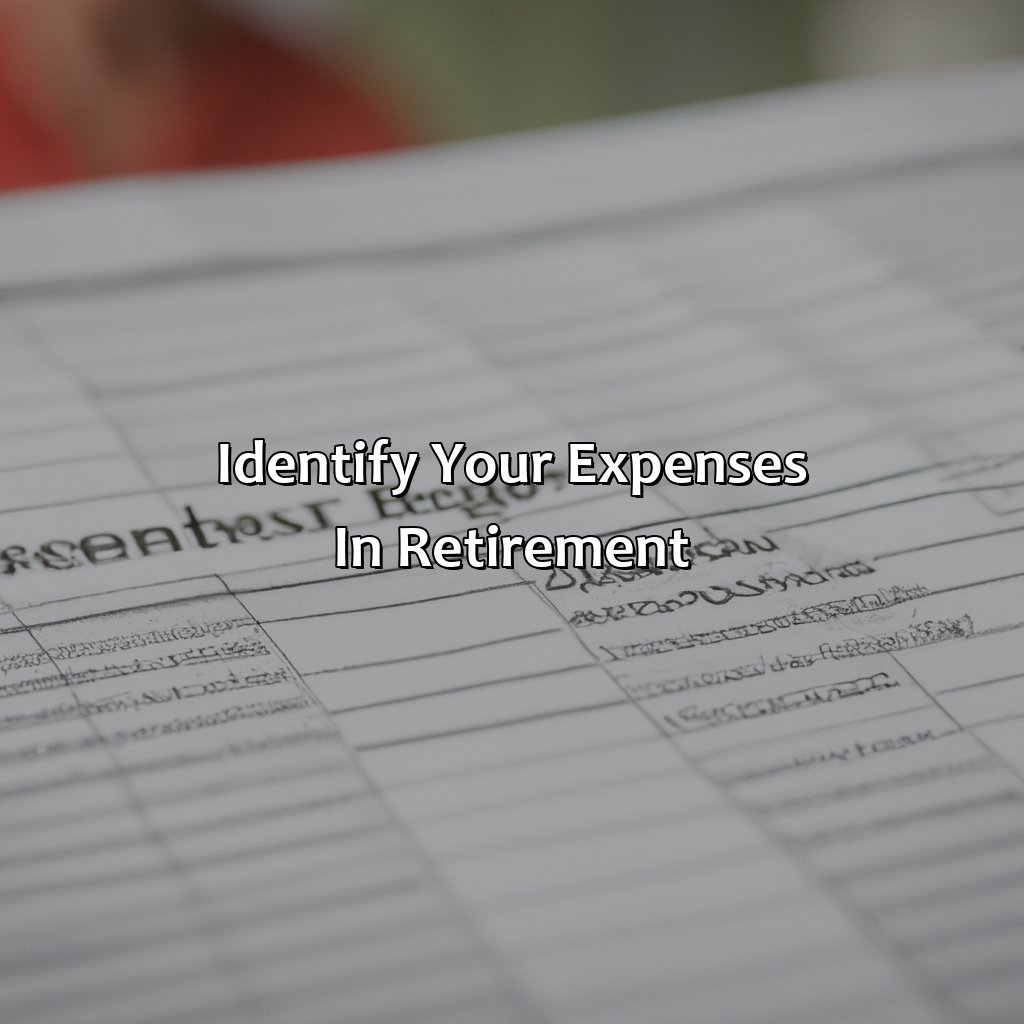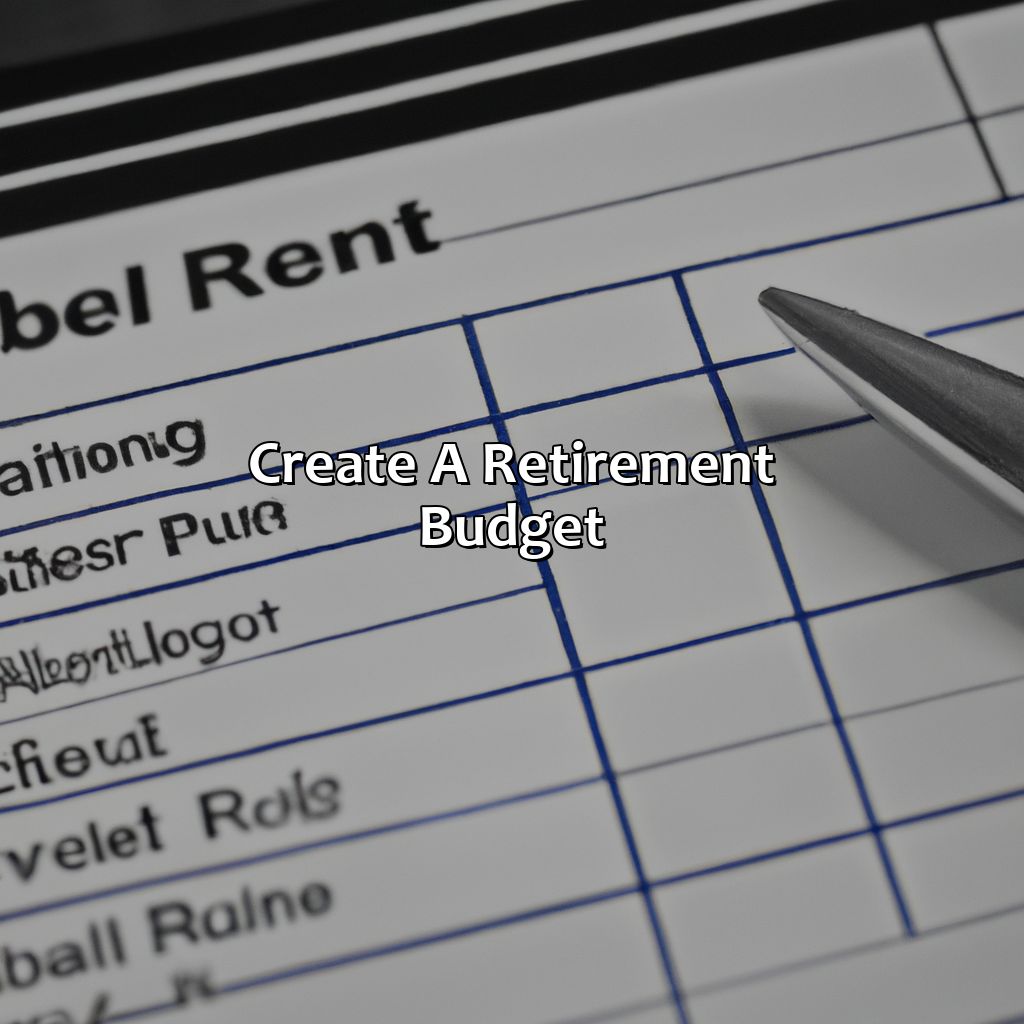How To Organize Your Finances For Retirement?
Key Takeaway:
- Assess Your Retirement Needs: Before organizing your finances for retirement, it’s important to understand your retirement needs. Take into account your lifestyle, healthcare expenses, and potential inflation to estimate how much money you’ll need in retirement.
- Analyze Your Sources of Income: Knowing how much income you’ll have in retirement is key to creating a successful financial plan. This includes Social Security benefits, pension plans, and other sources of income.
- Create a Retirement Budget: Based on your estimated retirement needs and sources of income, create a realistic budget that includes both essential and discretionary expenses. This will help you stay on track financially and avoid overspending in retirement.
- Reduce Debt and Increase Savings: Paying off high-interest debt and building an emergency fund are important steps to take while organizing your finances for retirement. Increasing your retirement savings is also crucial, whether through a 401(k), IRA, or other investment vehicles.
- Consider Seeking Professional Financial Advice: If you’re uncertain about how to organize your finances for retirement, it may be helpful to consult with a financial advisor. They can help you create a personalized plan that takes into account your specific financial goals and needs.
Are you worried about how your finances will support you in retirement? You don’t have to stress alone! This article will give you clear steps to take now to successfully organize and manage your finances for the years ahead.
Assess Your Retirement Needs
Assessing Your Retirement Needs: Professional Tips
Planning for retirement starts with the assessment of one’s retirement needs. Consider factors like the lifestyle, desired retirement age, and expected lifespan. Analyze costs of healthcare, living expenses, and other potential expenditures to estimate future expenses accurately. Understanding one’s retirement needs will help save required funds.
To meet retirement needs, it’s essential to ensure sufficient savings, investments, and other income sources. Participate in employer-sponsored retirement plans, such as 401(k)s, and build a diversified portfolio of stocks, bonds, and mutual funds. Always monitor progress towards retirement goals and adjust accordingly.
When considering retirement needs, don’t overlook healthcare expenses. Medicare or other insurance policies may not cover everything, so consider additional coverage to safeguard against rising healthcare costs. Consider investing in long-term care insurance, as well.
Recently, a friend of mine retired without adequately preparing for future expenses. Within a few years, they realized their mistake and started to face financial hardship. Thus, start early, be aware of your retirement needs and make informed decisions to secure your future.

Image credits: retiregenz.com by Yuval Woodhock
Analyze Your Sources of Income
Analyze your sources of income for retirement planning. Think about social security benefits, pension plans, and other sources. It’s important to understand your sources of income. This gives you a better idea of how much money you can count on each month. Retirement planning depends on it!

Image credits: retiregenz.com by James Washington
Social Security Benefits
First Retirement Income Stream: Government-backed support.
Social Security benefits provide a critical retirement income stream, particularly for those without substantial savings or other pension plans. Here are four points to remember:
- Monthly payments from Social Security provide a steady paycheck in retirement.
- Eligibility is based on work history and contributions made throughout your career.
- You can begin receiving benefits as early as age 62, but the longer you wait, the higher your monthly payments will be.
- Your spouse may also be eligible for Social Security benefits based on your work history, even if they’ve never worked themselves.
It is important to note that benefits might not cover all expenses. It’s recommended to evaluate individual requirements and factor in alternative sources of income as well.
For further guidance related to ensuring financially sound retirement incomes and maximizing social security benefits with each unique requirement, consider seeking professional financial advice.
True Story:
After living off Social Security even after working above and beyond his required retirement age, Ben was surprised to discover he qualified for additional financial support. With some help from professionals in managing his finances and exploring all options available to him, Ben was able to enjoy a more comfortable lifestyle during his golden years. Don’t hesitate – take charge of retirement planning today!
Saving for retirement is like investing in a pension plan- it’s like playing Russian Roulette with your financial future, but with less bullets.
Pension Plans
Retirement Compensation Arrangements (RCAs) are prevalent pension plans. Employers, employees or both can contribute to them, and the funds accumulate tax-free. After retirement, individuals withdraw the amount as a return of corporate capital instead of income. RCAs offer an excellent investment opportunity with numerous benefits.
RCAs provide more contribution room than registered pension plans. However, setting up RCAs requires the advice of knowledgeable financial professionals to ensure legal compliance with Canada Revenue Agency regulations. Choosing a reliable management team to handle RCAs is crucial for optimal results.
It’s worth considering a group RRSP or specified benefit pension plan if RCAs aren’t your cup of tea. Employers typically sponsor group RRSPs that allow participants to invest part of their pre-tax salary in long-term retirement savings plans.
A health crisis struck 40-year-old Jennifer before she could max out her Registered Retirement Savings Plan (RRSP). Her employer offered her an RCA plan instead; she hesitated at first but eventually agreed because it allowed her to double her regular contributions annually without paying taxes on interest earned within the RCA until withdrawal upon retirement 25 years later.
Who needs a backup plan when you have a side hustle that brings in enough dough to make your main income source jealous?
Other Sources of Income
Ascertaining Additional Revenue Streams
Diversifying income sources is vital for a secure retirement. Here are five additional revenue streams worth considering:
- Rental income from owned properties or vacation homes
- Profit from a side business or freelance work
- Dividends earned from stock market investments
- Pension schemes and annuities
- Social Security or retirement account distributions
Additionally, understand the tax implications of each revenue stream and plan accordingly.
Understanding these various sources of income is essential to achieve financial stability and peace of mind during your golden years.
A royal with an eye for passive income was King Carl XVI Gustaf of Sweden, who utilized his substantial private land holdings for forestry enterprises, hunting leases, and hydropower generation to add to his coffers.
Retirement expenses: where your dreams of jet-setting around the world collide with the reality of needing to budget for adult diapers.
Identify Your Expenses in Retirement
It’s key to classify expenses in retirement into essential and discretionary. This will help you focus and make wise choices about your budget. The perks and ways of managing these two kinds of expenses separately will be talked about in the sections below – essential expenses and discretionary expenses.

Image credits: retiregenz.com by Adam Washington
Essential Expenses
The essential expenses to consider for retirees are:
- Housing: This includes the cost of rent/mortgage, property taxes, insurance, and maintenance.
- Health care: Medical bills, premium for Medicare plans and supplemental health insurance are essential costs for retirees.
- Groceries and Utilities: Food expenses, electricity and gas bills, phone bills also come under essential expenses.
- Transportation: The cost of owning a car, gasoline charges or usage of public transportation should also be taken into account while budgeting for aged life.
- Taxes: Income taxes on your retirement benefits or other sources need to be considered as well in order not to have any issues.
Retirees have to remember that each case is unique.
Hence there might be additional or diverse mandatory expenses based on one’s lifestyle and geographical locations.
It’s crucial to identify your Essential Expenses early on for adequate financial planning.
Don’t miss out on necessary expenditure at this stage of life due to inadequate finance management.
Retirement may be the perfect time to indulge in some discretionary spending, but beware: a yacht is not a wise purchase if you can’t afford the captain’s hat.
Discretionary Expenses
Unnecessary Expenses, comprising leisurely pursuits and luxury goods bought without need, are considered Discretionary Expenses. These expenses often comprise travel and dining out or entertainment costs. Though necessary, the cap on such expenses is a function of one’s budget.
In retirement planning, it is vital to distinguish between essential and Discretionary Expenses. For example, groceries, healthcare costs and housing expenditures must be factored into the budget. On the other hand, impulse shopping or dining at fancy restaurants may not be functional inclusions in the budget.
One crucial point to ponder over is how much money would one have if retired today and no longer earned. Careful consideration of current savings with retirement income will aid accurate estimation of Discretionary Expenses. Preparing a hypothetical post-retirement plan can help as you explore your options.
As baby boomers retire, experts predict that Discretionary Spending will reduce from current levels among senior citizens who downsize homes and re-evaluate their spending patterns. Thereby ensuring long-term financial stability in the vast array of retirees worldwide.
Retirement budgeting: where you trade in your daily coffee habit for dreams of vacations you’ll forget in a few years.
Create a Retirement Budget
Creating a Solid Retirement Budget
To ensure a comfortable retirement, creating a budget plan is crucial. A well-planned retirement budget can save you from financial stress, especially in situations like unexpected medical expenses or emergencies.
Here are six essential steps to consider while creating a retirement budget:
- Estimate the necessary cost of living and calculate your annual expenses.
- Determine your monthly income from pensions, Social Security, and investments.
- Account for inflation, emergencies, and unexpected expenses in your budget plan.
- Track your expenses to ensure you are sticking to your plan.
- Adjust your budget as necessary and review it annually.
- Consider consulting with a financial advisor for further guidance on planning your budget.
In addition, it is essential to plan for long-term goals like traveling or healthcare costs. Keep in mind factors such as a potential increase in healthcare costs.
It is crucial to consider your unique circumstances while planning your retirement budget. Some of these considerations include retiring early or late, having dependent family members, or inheriting a significant sum of money.
To make sure your retirement budget always works in your interest, avoid high-risk investments and keep track of your expenses.

Image credits: retiregenz.com by James Arnold
Reduce Debt and Increase Savings
To reduce financial stress and increase your savings for retirement, you should focus on paying high-interest debt off. Also, you should set up an emergency fund and save specifically for retirement.
In this section we will explain how each of these can help you organize finances for a successful retirement.

Image credits: retiregenz.com by David Washington
Pay off High-Interest Debt
It is essential to eliminate high-interest debts before retirement. Your finances must be in shape to provide a comfortable life after you retire. High-Interest debt can cripple your plans for the future and prevent you from enjoying your golden years adequately. Consider paying off credit card debt, personal loans, or other debts with high interest. By doing so, not only do you free up cash flow, but it leads to less anxiety about money when you are no longer working.
If you want to reduce stress and enjoy retirement without worrying about finances, consider getting rid of high-interest debts first. Credit cards and such forms of debt could cost you thousands of dollars in interest payments over time that could instead go towards savings for retirement. Create a budget by tracking expenses, and avoid new debts while trying to pay off existing ones.
Make sure your retirement savings stay on track by prioritizing debt elimination as soon as possible. You’ll thank yourself later when any future emergencies don’t come with added financial pressure.
Studies conducted by the National Institute on Retirement Security show that 66% of bills require those below 30 years old to save at least 15% of their salary towards retirement if they want to accumulate enough resources throughout their career.
When life gives you lemons, make lemonade. When life gives you an unexpected expense, dip into your emergency fund.
Build an Emergency Fund
Having a rainy day fund is imperative for everyone, particularly to prepare for any unforeseen expenses that may arise. In this section, we will delve into the importance of creating an Emergency Fund and methods to Build it.
To Build an Emergency Fund:
- Set a goal by determining how much money you need to save
- Make Saving Automatic by automatically transferring a small amount from every paycheck directly into your emergency savings account
- Avoid using your emergency funds unless it’s indispensable.
- Create a seperate account for your emergency fund instead of using one account for all your savings
- Earn Interest on Savings with high-yield savings accounts that let you earn more interest on the money put away.
- Reward Yourself by treating yourself with something small when you reach or surpass each goal.
It is wise to maintain at least three months’ worth of living expenses as Emergency Funds in the account. Moreover, resist the urge to divert these funds towards impulsive purchases or non-emergency contingencies.
Ray, who recently lost his job unexpectedly, had always considered keeping an Emergency Fund as unnecessary. However, when he was dealt with the sudden unfortunate news, he realized its importance and wished he had built an Emergency Fund earlier.
Retirement savings is like a gym membership- it hurts now but you’ll thank me later.
Save for Retirement
For Securing Your Retirement Funds
Saving for retirement is essential to ensure financial stability and security in our golden years. Here are three points that can be useful to save for your retirement:
- Start Saving early: It’s never too early to begin saving for retirement. The earlier you start, the more time your money has to grow.
- Invest in suitable plans: If you are not sure of investing strategies or savings plan that’s best suited for you, Consult with a Financial Advisor who can help you make informed decisions.
- Increase Savings Contributions: Consistently increasing your savings contributions will have a significant impact on your retirement fund. With each pay raise or bonus received, consider allocating it towards retirement savings.
To Achieve Financial Goal
We need to explore various paths of managing debt, saving as much as possible, and considering investment opportunities to reach financial goals before we retire. A few ways you can achieve these goals include creating a budget plan and sticking to it. If you are struggling or need additional guidance, seek a trustworthy financial advisor for support and recommendations. Finally, pay off high-interest loans first and always remember “Slow and Steady wins the race.”
Consider Seeking Professional Financial Advice.
As you plan for retirement, it is important to seek expert financial guidance. Professional financial advice can provide valuable insight and help you make informed decisions about your retirement finances. An experienced financial advisor can help you identify potential risks and opportunities, and develop a personalized strategy based on your unique needs and goals.
When seeking professional financial advice, be sure to choose a qualified advisor who is experienced in retirement planning. Look for someone with a strong track record of success and a thorough understanding of the financial landscape. It is also important to choose someone who you feel comfortable working with and who communicates clearly and effectively.
In addition to helping you develop a retirement plan, a financial advisor can also guide you through the process of selecting and managing retirement accounts, such as IRAs and 401(k)s. They can help you make informed decisions about contributing to these accounts and choosing appropriate investments to help you reach your retirement goals.
Don’t miss out on the benefits of professional financial guidance. Take the first step towards a secure retirement by seeking expert advice today.

Image credits: retiregenz.com by James Jones
Five Facts About How To Organize Your Finances For Retirement:
It is recommended to start saving for retirement as early as possible to allow for compound interest to grow your savings. (Source: NerdWallet)
Creating a budget and sticking to it is crucial in managing your finances leading up to retirement. (Source: The Motley Fool)
Diversifying your investments and choosing a mix of stocks, bonds, and other assets can help reduce risk in your retirement portfolio. (Source: Forbes)
Social Security benefits can play a critical role in providing retirement income, so it’s important to understand how they work and when to claim them. (Source: Investopedia)
Working with a financial planner or advisor can provide valuable guidance and help ensure you are on track to meet your retirement goals. (Source: The Balance)
FAQs about How To Organize Your Finances For Retirement?
What are some important steps to take when organizing finances for retirement?
To begin organizing your finances for retirement, it’s important to take stock of all your assets and debts, create a budget, and establish clear financial goals. It’s also wise to review any existing retirement accounts and consider working with a financial advisor to create a comprehensive retirement plan.
What types of retirement accounts should I consider?
There are several types of retirement accounts to consider, including 401(k)s, IRAs, and Roth IRAs. Each has its own set of rules and benefits, so it’s important to research which account(s) would best fit your retirement goals and financial situation.
How much should I be saving each month for retirement?
The amount you should save for retirement each month depends on your individual financial situation and retirement goals. Financial advisors often suggest saving 10-15% of your income towards retirement, but it’s important to calculate your own retirement needs and adjust your savings accordingly.
What can I do to ensure my retirement savings grow?
One way to ensure your retirement savings grow is to invest your funds in a diversified portfolio, rather than keeping them in a low-interest savings account. It’s also important to monitor and adjust your investments as needed, and to avoid withdrawing funds from your retirement accounts before age 59 ½ to avoid penalties.
What happens if I haven’t started saving for retirement yet?
If you haven’t started saving for retirement, it’s never too late to begin. While your retirement goals may need to be adjusted based on how much time you have left until retirement, the sooner you start saving, the better off you’ll be. Consider working with a financial advisor to create a plan and assess your options.
Why is it important to have a plan for retirement?
Having a plan for retirement is important because it allows you to prepare financially, emotionally, and practically for this major life change. Without a plan, you may not have enough money saved, may struggle with the lifestyle changes that accompany retirement, or may find yourself making decisions on the fly without a solid foundation to guide you.
 Checkout this IRS Loophole
Checkout this IRS Loophole 




